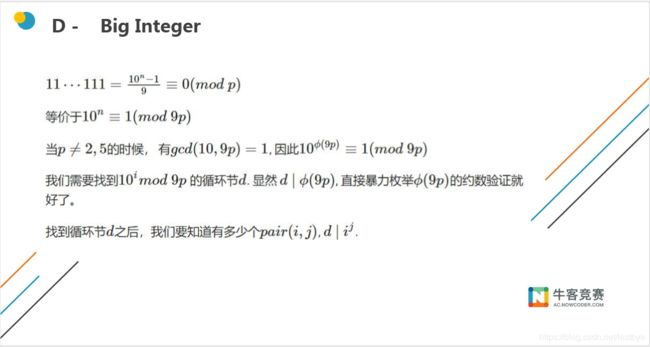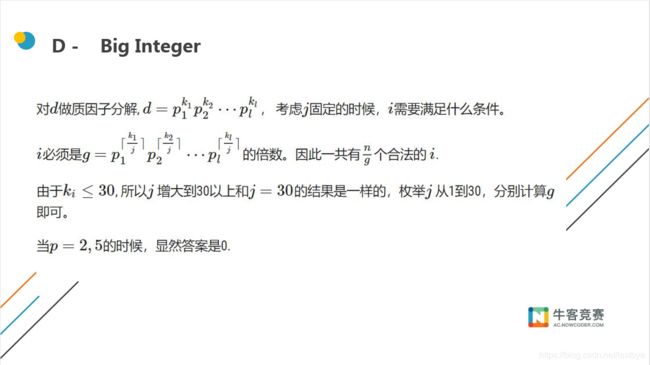题解 | Big Integer-2019牛客暑期多校训练营第三场D题
题目来源于牛客竞赛:https://ac.nowcoder.com/acm/contest/discuss
题目描述:
For little pupils, a very large number usually means an integer with many many digits. Let’s define a class of big integers which consists only of the digit one(11⋯1). The first few integers in this class are 1,11,111,1111⋯. Denote A(n) as the n-th smallest integer in this class. To make it even larger, we consider integers in the form of A(ab) . Now, given a prime number p, how many pairs (i,j) are there such that 1≤i≤n, 1≤j≤m, A(ij)≡0(mod p).
输入描述:
The input contains multiple cases. The first line of the input contains a single integer T (1≤T≤100), the number of cases. For each case, the input consists of a single line, which contains 3 positive integers p,n,m (p,n,m≤109).
输出描述:
Print the answer, a single integer, in one separate line for each case.
示例1:
输入
2
11 8 1
7 6 2
输出
4
2
#include
using namespace std;
typedef long long LL;
vector > plist;
int pow_mod(int x, int k, int p)
{
int ret = 1;
for (; k; k>>=1)
{
if (k&1) ret = 1LL*ret*x%p;
x = 1LL*x*x%p;
}
return ret;
}
int f(int n, int k)
{
int d = 1;
for (auto pv: plist)
{
int t = (pv.second+k-1) / k;
while (t--) d *= pv.first;
}
return n/d;
}
int main()
{
int T, n, m, p, d, D;
scanf("%d", &T);
while (T--)
{
scanf("%d %d %d", &p, &n, &m);
if (p == 2 || p == 5) {puts("0"); continue;}
if (p == 3) // 10^d = 1 mod 27
{
//phi(27) = 18
D = 18;
p = 27;
}
else D = p-1;
assert(pow_mod(10, D, p) == 1);
d = 1e9;
for (int i = 1; i*i <= D; ++i)
{
if (D % i) continue;
if (pow_mod(10, i, p) == 1)
d = min(d, i);
if (pow_mod(10, D/i, p) == 1)
d = min(d, D/i);
}
for (int i = 2; i*i <= d; ++i)
{
if (d % i) continue;
int c = 0;
while (d % i == 0) ++c, d /= i;
plist.push_back(make_pair(i, c));
}
if (d != 1) plist.push_back(make_pair(d, 1));
LL ans = 0;
for (int i = 1; i <= 30 && i <= m; ++i)
ans += f(n, i);
if (m > 30) ans += 1LL*(m-30)*f(n, 30);
printf("%lld\n", ans);
plist.clear();
}
return 0;
}
题目来源于牛客竞赛:https://ac.nowcoder.com/acm/contest/discuss

